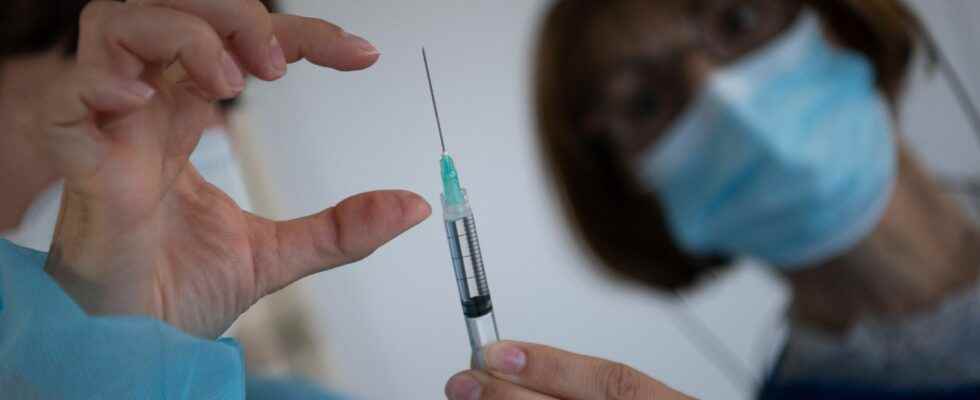“A burst of vaccination to protect” against Covid-19. This is the call launched this Friday, December 9 by the Minister of Health François Braun, who held a press conference on the “triple epidemic” (Covid-19, influenza, bronchiolitis) which currently affects France. “Too few people are vaccinated even though I have seen better figures in recent days”, regretted the minister. According to him, only 2.8 million recalls have been made since the beginning of October.
“Everyone can get vaccinated” with an anti-Covid booster dose, François Braun recalled a little earlier today, on BFMTV and RMC. While the communication on the booster vaccination this fall has been criticized for its confusion, François Braun hammered home that “vaccination is not reserved for people at risk, for those over 60 (…) But the target , even if the term is not very good, they are the most fragile”.
The ninth wave of the Covid-19 epidemic is “still progressing” in France, associated with an increase in hospitalizations and deaths, observed Thursday Public Health France.
Incidence rates continued to increase in all regions of mainland France, under the effect of a wave still carried by the Omicron variant, particularly the BQ.1.1 sub-lineage. According to the latest count from Public Health France, it would have become the majority in new contaminations with 58% of cases.
A noticeable drop in protection four to six months after the injection
One of the reasons for this increase in the number of cases is the erosion over time of vaccine protection against infection. “Many data suggest a decline in the effectiveness of the vaccine over time. We consider that this decline is probably more marked around four months”, details virologist Yannick Simonin with L’Express. This decline is “gradual” and begins about “ten to twelve weeks” after the injection, continues the research professor at the University of Montpellier.
The decrease in efficacy nevertheless depends on several parameters such as age, immune status or the number of doses already received. “There is a direct correlation between the drop in protective antibodies and age: the older you are, the faster this drop, in other words, the risk of infection is faster than for the youngest, explains to L’Express Bruno Lina, professor of virology at the Lyon University Hospital and member of Covars, the successor to the Scientific Council. This gradient appears from the age of 60 and is very marked beyond the age of 80.”
According to Bruno Lina, the gradual decline in immunity occurs “between three and six months” after the injection depending on these different parameters. “In an adult under the age of 60, we can consider that the protection is still significant six months after vaccination, but it then drops quite quickly”, he notes, before mentioning other parameters to be taken into account. . “We know that people vaccinated and infected with the virus are better protected than those who have only been vaccinated.”
As franceinfo relates, according to Elisabeth Bouvet, the president of the technical commission vaccination at the High authority of health (HAS), the effectiveness of the vaccines against the transmission of the virus is between 50 and 60% just after the injection. It drops to about 30% three to six months later. In any case, vaccinated people have “almost no more protection between six months and a year” after having received a dose, underlines Yannick Simonin, which therefore significantly increases the risk of infection, or reinfection.
A booster dose to “spend the holidays as peacefully as possible”
Among those over 80, around 20% received a fourth dose, 35-40% for those aged 60-80, “it is largely insufficient”, regretted the Minister of Health François Braun.
In the oldest people, especially those over 80, “the immune system reacts less well to infections and vaccination”, recalls Yannick Simonin. This beginning of winter is therefore “the good time to get vaccinated”, says the virologist. He adds: “It’s really worth receiving an injection in order to try to spend the end of year celebrations as peacefully as possible.” The booster dose is also recommended for people in good health if they frequent people at risk, the elderly or weakened, he recalls.
“The vaccine booster allows us to put ourselves back for three months at extremely high levels of protection, it is therefore interesting in a context of circulation of the virus”, abounds Bruno Lina. And all the more so since, as the two virologists point out, the benefit of the booster dose is almost immediate: the immune system is on average reboosted one week after vaccination, at the earliest five days after, at the latest ten days after.
The risk of developing severe forms is reduced
If the vaccine does not prevent infection or reinfection, including a few weeks or a few months after receiving a dose, it nevertheless allows “to reduce the most severe forms”, in other words, it causes a “reduction of the intensity and duration of symptoms”, observes Yannick Simonin. In younger and healthy people, the cellular immunity acquired through prior vaccination, however, provides lasting protection against severe forms, for at least six months, he recalls.
“The vaccination and immunity that have developed over the past two and a half years lead to an extremely significant reduction in the serious forms of the disease. They occur in people who have decompensated their chronic pathology”, observes Bruno Lina.
For Yannick Simonin, if the health authorities currently recommend that people aged 60 to 79 receive their second booster dose six months after the injection of the first booster, the recommendations could change: “It will probably not be useless to do a reminder every three months for this category of people”. A period of three months already recommended for the over 80s, people residing in nursing homes and immunocompromised people.
